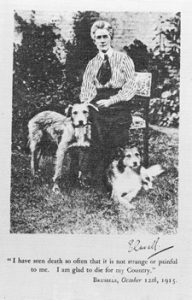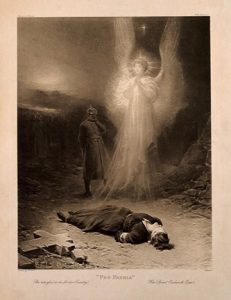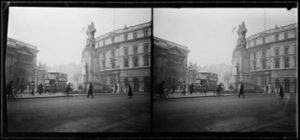
In the cold, dark cell of St. Gilles prison, Edith Cavell waited for a decision on whether she would live or die. After a lifetime of virtuous deeds, service work, and taking care of those most in need, Edith Cavell never expected to end up this way. Little did she know that all her life’s work would lead her to this situation. People in her position would question, was it worth it? Was it worth sacrificing your life for others? Was It worth putting yourself in danger for others? Edith Cavell might answer proudly that, if she saved some lives and freed some people from suffering, it was indeed all worth it.
Working as a governess in Belgium made Cavell realize that she could do more with her life. She had this fervent desire to help others, a desire that was instilled in her by her parents. Her mother was known for her charm, kindliness, and sweet personality, which made her stand out due to the thoughtful consideration of others.1 In the fall of 1895, after finding out that her father was ill, she decided to resign her post as a governess for the Françoise family in Belgium and return to England.2 Edith’s dream was to work in a field that would make her feel humble and allow her to aid humankind. She found this through helping her father when he was sick and nursing him back to health. This was the moment she decided to become a nurse.

Throughout her training, nurse Cavell proved to herself and to others that she not only possessed extraordinary capabilities in the health-care profession but also that she was an industrious teacher as well. She had the capabilities to extend her knowledge to other nurses, as well as to others who wanted her help. All these skills and values opened doors to a successful and prosperous career as a nurse and teacher. It was at the peak of Cavell’s career, acting as a directress of three hospitals and giving numerous lectures to nurses and doctors when the unimaginable happened.3 While enjoying her mother’s company back in Britain, war broke out. News traveled fast; Belgium had been invaded by Germany. There was no hesitation; Cavell had to return to Brussels, where she knew that she was needed.
German soldiers portrayed fear and dominance as they were merciless and brutal in their occupation of Belgium. When the German forces invaded Brussels, citizens were arrested and shot for no reason, or they were forced to work in their munition factories.4 As a nurse, Cavell felt obligated to help everyone who needed help, no matter what side of the war they were on. One of the first acts from the German forces in Belgian territory was to take over the hospitals. This resulted in Cavell and her colleague, Nurse Wilkins, joining the German ranks of nurses and doctors who worked in the Red Cross hospital. Many of the nurses were angry with rage about how the German soldiers behaved, as they deemed themselves as superiors, treating citizens badly, shooting them for no reason, and harming anyone in their way. This resulted in many Belgium nurses treating German wounded soldiers with indifference. However, Cavell did not discriminate, as she believed that her duty was to help anyone who needed it. She urged her nurses and colleagues to rise above their circumstances and put their discrimination aside, in order to take proper care of whomever God put in front of them.5
All of Edith Cavell’s values and principles came from her family and how they raised her. Edith’s sense of duty was undoubtedly influenced by her father. He possessed Spartan qualities, for no sacrifice or hardship was too rigorous for him to undergo in the name of his God.6 Edith grew in the constant shadow of duty. She grew accustomed to seeing her parents give aid to the poor and sick, even though that meant that her family must live without comfort or pleasures. Both of her parents were Christian and were devoted to God. Edith grew along with her sisters from her father’s sermons to them, professing that humanity is for all people. It can be implied that her Christianity played a big role when she decided to help even those German soldiers who treated so many so badly.
As the war progressed, the number of wounded escalated. The Allied soldiers were the most impacted by the German invasion, as they were arrested and tortured, and treated as war prisoners. However, nurse Cavell participated in simple acts of humanity that helped thousand from the Germans’ oppression. Edith Cavell allowed her hospital to be used in the chain of rest-houses, in which fugitives escaped detection and arrest, as they passed from point to point across the Dutch frontier.7 Edith’s sympathy gave birth to an organization that helped several hundred fugitive Allied soldiers cross the border to Holland. However, her willingness to help Allied soldiers came from an event that made Edith change her perspective.
The war was catastrophic, leaving more people wounded and suffering each day. German soldiers became increasingly violent, shooting people in cold blood, starting house-to-house searches, looking for fugitives to kill. On an unexpected night, a letter from Madame Depage, a Belgian nurse, came to Cavell’s doorstep, requesting help to aid some soldiers to safety. The letter had a desperate tone, requesting immediate medical attention for two English soldiers who had been wounded in battle. Without hesitation, Cavell rushed to the soldiers and took care of their wounds. Nevertheless, Cavell wanted to do more, as she knew that if the soldiers remained in Belgium, they were going to be harmed again by their German oppressors. She decided to take them to safety.
“I am sure I can help you. I have friends in Brussels from whom I can learn about guides who will take you to the border. But we must be very careful and it may take some days or even weeks before it will be safe for you to leave. We must take no chances.”8
After seeing that she was able to free those English soldiers from the Germans and their certain death, there was no doubt within Cavell that she could do more and that she must continue doing this, no matter the risks. Edith was very determined; she wanted to help Allied soldiers reach safety in Holland. However, due to the extraordinary determination of the German soldiers, Edith had to be very cautious. Cavell did not even communicate to her fellow nurses about her involvement in such activities, as it could endanger them and endanger the operation.
As Edith began helping soldiers, she discovered that there were hundreds of fugitives in hiding and in constant fear of their lives. This made her one of the principal agents in receiving fugitives when they reached Brussels. Cavell’s collaboration was to shelter incoming refugees until her contact in Holland had everything prepared to conduct them to the border.9 However, today we might regard these good deeds as heroic and humanitarian, but this was not the case in Brussels in 1915. The majority of Edith’s colleagues and members of the hospital’s committee disapproved of this conduct, as they thought Edith was risking too much for these others. Ignoring their opinions, Edith continued to save soldiers, and she tried to be as careful as she could because she knew that if the German soldiers caught her, it was an assured death.
One must think that after seeing that Edith Cavell sacrificed a lot for other people and that she performed so many heroic deeds, that no one would be capable of betraying her or her cause, especially in these desperate times. However, after a lifetime of virtuous actions, little did Edith Cavell know she was going to be betrayed doing the thing that she loved most, helping people.
Georges Gaston Quien was a French soldier who would play that role in Edith Cavell’s life. Quien was a tall, handsome Frenchman, who had a charming personality, who flirted with the nurses, and who made himself a nuisance in the nursing home.10 Despite his charm and good social skills, Sister Wilkins, Edith’s colleague, always had a sense of distrust towards him and advised Edith several times to get rid of him. However, Quien stayed and asked for Edith’s help; but little did Edith know that he was a spy from the German government, with the mission of capturing fugitive Allied soldiers. Edith provided everything to Quien, from money to shelter, but progressively his behavior became too suspicious. Those suspicions started when Edith gave him the opportunity to cross the Dutch border, as he was supposed to be a French officer; surprisingly, he remained in Brussels. Edith could have sent him to the border into Holland within about two or three days; however, Quien pretended that he would make his escape in company with certain agents of the Brussels police.11
Edith became very suspicious of him, and she finally kicked him out of the shelter, as he was not welcomed anymore. Until this day, it is uncertain what Quien told the police, but what is known is that he tipped off the Germans, and they arrested architect Bauq, Cavell’s collaborator, and Mlle. Thuillez, all members of Edith’s team. After those arrests, Quien started to tell people from the organization that Cavell was going to be arrested; and he was not wrong. A few days later, Cavell was also arrested, on August 5, 1915.12
On that quiet evening of August 5, the door of Nurse Cavell resounded through the empty hospital.13 Not waiting for a response, German soldiers burst open the door, carrying their rifles, looking for Edith. Once they found her, they dragged her across the hospital into the dark night in Brussels. Even though the German soldiers behaved with brutality and violence, Edith remained calm and reacted with dignity, as they took her to St. Gilles prison.
Edith and her colleagues were behind bars in the cold prison of St. Gilles. Days after her arrest, Edith was brought in for questioning, where she was confronted with her recent activities of the past month. After talking with German authorities and other inmates, she finally understood that the reason for her arrest was the information that Quien had told the Germans. This confirmed all of Edith’s doubts and suspicions about Quien, but most importantly, it showed that not all people could be trusted. It could be assumed that Edith must have felt fear, as her fate rested in people who saw her humanitarian acts as unforgivable.
The questioning was never-ending. In one more round of questioning, Edith was asked whether she thought these men, for whom she had risked so much, were grateful. She answered proudly “oh, but they weren’t ungrateful. Some of them even wrote to me thanking me for what I had done for them and telling me that they had reached England safely.”14 By saying that, she left no doubt to her questioners that she did not regret anything, that instead, she felt proud. The interrogators became brutal and implacable, as her questioners aimed to assure her condemnation for her actions, and not for justice.

The German authorities made no public announcement about Cavell’s arrest. There was no sign of Edith for about three weeks, and people started to get worried since what she was doing was risky and her life was at risk. Her relatives did not hear about her for a prolonged time, until the most devastating news came, that Edith was arrested and was at St. Gilles prison. The news traveled fast, causing a lot of people to be angered and devastated, as Edith was being condemned for helping people. With bad intentions, the German police cut any form of communication with her; the outside world had no news of Edith whatsoever. After several days of interrogation, Edith admitted to all of the charges that were made against her, but she also did the unimaginable. She admitted to other charges that she didn’t do, making the German soldiers avoid the suspicions of her colleagues and accept all the charges herself.15 Actions like these show how Edith put others before herself, showing how pure-hearted she was.
The days in St. Gilles seemed eternal. Weeks passed, and Edith was still going to interrogations and trials. The verdict did not come quickly. The German authorities took their time in deciding the fate of Nurse Cavell. But the day finally came, the verdict was ready, and Edith’s destiny was already decided. Around fourteen prisoners were taken from their cells, and a gloomy environment began to rise. The corridors were silent, the prisoners were walking to find out whether they would live or die at the hands of the German soldiers. Once the prisoners arrived at the cold room, they remained silent; there was tension in the room, and distress was clear on the soldiers’ faces. The German authorities began to read the verdicts one by one. When it was Cavell’s turn, people held their breath in the hope of a miracle; she committed no crime in the eyes of God; she was just trying to help. The moment arrived, the German soldier announced, Edith Cavell, death penalty.16. At this moment, Edith became unpardonable in the eyes of the German military and she was going to be executed for successfully helping Allied soldiers. She was sentenced for giving food, shelter, clothes, and hope to soldiers who were brutally harmed.
The sun was shining bright on such a dreary day. The next morning after her verdict, Cavell’s execution took place. Led by German soldiers, Cavell walked to her last moments. Cavell remained calm and did not refuse; this impressed the German soldiers, as she was walking to her death in a peaceful manner. Cavell took the last breath and spoke her last words:
“Patriotism is not enough. I must have no hatred or bitterness towards anyone.”17
Cavell stood still, then she swooned and fell; the officer in charge stepped forward and shot her through the head, close to the ear.18 Ten miles north of Brussels, in the Tri-National Firing Range in Schaerbeek, Cavell’s body laid.19
In death, Cavell became a martyr. British propaganda started to use Cavell’s deeds and death as a form of exhibition for German cruelty and evilness. Cavell’s execution was just one incident in a list of war crimes, including the alleged bayoneting of babies reported by the British press.20 Nonetheless, Cavell’s death was transmitted worldwide, leaving a profound reaction even after the war. Within a fortnight of the Armistice, The Observer reported that a Franco-Belgian delegation “knelt with deep emotion at the grave of the British national heroine, Miss Edith Cavell, who rests among the Allied martyrs. Cavell’s resting place, marked by a simple wooden cross and, according to Batten, in the most anonymous graveyard in all of Brussels.”21
Cavell’s legacy still to this day prevails. Edith Cavell is a significant figure whose deeds and values we need to practice in today’s society, where we see discrimination happening constantly. The bravery of Cavell should be remembered for her work as an advocate for helping and aiding others in such critical times. We should admire and reverence the example of such a noble woman. There are an estimated 1,000 men Cavell helped to join or rejoin the allies while she was alive, but that number pales in comparison to the numbers her legacy inspired to enlist.22 The lesson that Edith Cavell left for society is that it is possible to love even one’s enemies and those who even cause your death. The tears shed for Edith will always be remembered, leaving her legacy alive, and should be remembered for eternity.

- Helen Judson, Edith Cavell (New York: The Macmillan company, 1941), 22, https://catalog.hathitrust.org/Record/001574144. ↵
- Helen Judson, Edith Cavell (New York: The Macmillan company, 1941), 26, https://catalog.hathitrust.org/Record/001574144. ↵
- Ernest Protheroe, A Noble Woman: the Life-Story of Edith Cavell (London: C.H. Kelly, 1916), https://catalog.hathitrust.org/Record/005798069.7-167. ↵
- Terri Arthur, “Edith Cavell: The Other Nightingale,” OJIN: The Online Journal of Issues in Nursing vol. 25, no. 2 (2020): https://ojin.nursingworld.org/MainMenuCategories/ANAMarketplace/ANAPeriodicals/OJIN/TableofContents/Vol-25-2020/No2-May-2020/Edith-Cavell-The-Other-Nightingale.html ↵
- Terri Arthur, “Edith Cavell: The Other Nightingale,” OJIN: The Online Journal of Issues in Nursing vol. 25, no. 2 (2020): https://ojin.nursingworld.org/MainMenuCategories/ANAMarketplace/ANAPeriodicals/OJIN/TableofContents/Vol-25-2020/No2-May-2020/Edith-Cavell-The-Other-Nightingale.html ↵
- Helen Judson, Edith Cavell (New York: The Macmillan company, 1941), 13, https://catalog.hathitrust.org/Record/001574144. ↵
- Ernest Protheroe, A Noble Woman: the Life-Story of Edith Cavell (London: C.H. Kelly, 1916), 27, https://catalog.hathitrust.org/Record/005798069.7-167 ↵
- Helen Judson, Edith Cavell (New York: The Macmillan company, 1941), 208, https://catalog.hathitrust.org/Record/001574144. ↵
- Helen Judson, Edith Cavell (New York: The Macmillan company, 1941), 234, https://catalog.hathitrust.org/Record/001574144. ↵
- Helen Judson, Edith Cavell (New York: The Macmillan company, 1941), 257, https://catalog.hathitrust.org/Record/001574144. ↵
- “The Betrayal of Edith Cavell: Trial and Conviction of Quien, the Spy Who, After Receiving Aid from Her, Caused Her Death,” Current History (1916-1940) 11, no. 1 (1920): 121. ↵
- “The Betrayal of Edith Cavell: Trial and Conviction of Quien, the Spy Who, After Receiving Aid from Her, Caused Her Death,” Current History (1916-1940) 11, no. 1 (1920): 121. ↵
- Ernest Protheroe, A Noble Woman: the Life-Story of Edith Cavell (London: C.H. Kelly, 1916), 36, https://catalog.hathitrust.org/Record/005798069.7-167 ↵
- Helen Judson, Edith Cavell (New York: The Macmillan company, 1941), 272, https://catalog.hathitrust.org/Record/001574144. ↵
- Ernest Protheroe, A Noble Woman: the Life-Story of Edith Cavell (London: C.H. Kelly, 1916), 39, https://catalog.hathitrust.org/Record/005798069.7-167 ↵
- Helen Judson, Edith Cavell (New York: The Macmillan company, 1941), 285, https://catalog.hathitrust.org/Record/001574144. ↵
- Ginny A. Roth and Elizabeth Fee, “A Soldier’s Hero: Edith Cavell (1865-1915), American Journal of Public Health, no.10 (2010): 2. ↵
- Ernest Protheroe, A Noble Woman: the Life-Story of Edith Cavell (London: C.H. Kelly, 1916), https://catalog.hathitrust.org/Record/005798069.7-167. ↵
- Terri Arthur, “Edith Cavell: The Other Nightingale,” OJIN: The Online Journal of Issues in Nursing vol. 25, no. 2 (2020): https://ojin.nursingworld.org/MainMenuCategories/ANAMarketplace/ANAPeriodicals/OJIN/TableofContents/Vol-25-2020/No2-May-2020/Edith-Cavell-The-Other-Nightingale.html ↵
- Guy Richard Hodgson, “Nurse, Martyr, Propaganda Tool : The Reporting of Edith Cavell in British Newspapers 1915–1920,” Media, War & Conflict 10, no. 2 (August 1, 2017): 243. ↵
- Guy Richard Hodgson, “Nurse, Martyr, Propaganda Tool : The Reporting of Edith Cavell in British Newspapers 1915–1920,” Media, War & Conflict 10, no. 2 (August 1, 2017): 247. ↵
- Guy Richard Hodgson, “Nurse, Martyr, Propaganda Tool : The Reporting of Edith Cavell in British Newspapers 1915–1920,” Media, War & Conflict 10, no. 2 (August 1, 2017): 250. ↵



17 comments
Sydney Nieto
Firstly, congratulations on the award. I had never heard of Edith Cavell but honestly, I was surprised on how brave she was. From the start she nursed her farther bad to health and continued that through her life. It does suck when you try to do something good and others take advantage and betray, but although she got arrested, she remained calm.
Azeneth Lozano
Very well-written and detailed article about an impactful figure during World War I. Sadly, her story is not well-known but nonetheless, she was a life-saving hero that did not get enough respect. It is sad to hear her life came to an end all because she was doing what she loved most in such hard times. Overall, congratulations on your award and inspiring article!
Anayetzin Chavez Ochoa
I love her energy! She sounds like the personification of nurse behavior, or should I say, healing behavior. She was clever and intelligent, and as you said, no one felt the capacity to turn against her (until Georges Quien). This makes me happy, yet filled with sadness, because her actions were noble and her heart was so good. She took the blame for others and loved her enemies until the very end, she is a fine example of how all humanity should be: merciful and full of compassion. Thank you for introducing us to a noble woman of history!
Lauren Deleon
This is such a sad story, as most World War I stories are. How awful that Cavell was executed when she just wanted to help as many people as she could despite what side of the war they were on. Although I had never heard this story before I am sure that she is remembered by those who work in the medical field and in organizations such as the Red Cross. Her story is such a wonderful example, like you said, on how to love your enemies and help people indiscriminately.
Lauren Deleon
It was so great learning about Edith’s story and how she used her medical knowledge to not only aid her country but to help everyone who was hurt in the terrible war. You did a great job telling her story and although it has a very sad ending I really enjoyed reading about Edith and how she still serves as an example of compassion in war time even to this day.
Eugenio Gonzalez
First of all, congratulations on your winning article. The author does an excellent job of explaining how Edith Cavell decided to become a nurse. Not being indifferent towards German soldiers, even if they mistreated her and her colleagues, says much about Cavell’s character and principles. What an unfortunate ending Edith Cavell had after her humanitarian acts toward Allied soldiers and doing her job as a nurse.
Jacob Adams
The award this one was deserved for sure. I had no knowledge of Edith prior to reading this article. I am always curious about women and there pivotal roles in history. I found it most interesting that her death echoed throughout the world in the British press, which must have inspired many people. More stories like this need to be shared to us that shows not just men were significant to the war effort.
Grace Malacara
First and foremost, congrats on your article award! This was a pretty interesting article to read; I had a foggy recall of briefly learning about Edith Cavell, so I feel like I truly got a sense of her narrative after reading this article. It was really well written and covered key periods in her life, which helped me comprehend her history. It’s tragic that she was killed while doing what she loved most and was proud of, but her tale is inspiring and moving.
Madison Goza
Your article was a fascinating read! Your opening immediately caught my attention and drew me in; I was asking myself, “Who is she, what happened, why?” You took great care to emphasize her background, her family, her professionalism, and her values. Her willingness to help others and bring Allied troops to safety is what in the end hurt her, yet she didn’t regret her actions though it would lead to her arrest and execution. She was a very brave woman, and I think you told her story very well. Great article!
Madeline Chandler
This was an extremely well written article, and it was so detailed. I honestly have never heard of Edith Cavell yet I truly wish I had because her story is astounding. She showed such amazing characteristics that anyone little girl can learn from. Her medical capabilities were far past her time as well as her teaching ability. Not only was she an amazing nurse, she was so very brave. She would protect soldiers and eventually the German ended up executing her. Till the end she was helping people and protecting her country.